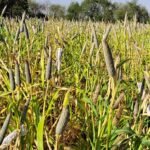By Jean K. Eyase, January 23, 2024, Agriculture and Climate Risk Enterprise Limited (ACRE Africa) in partnership with the Banana Industrial Research Development Center (BIRDC) and Agro Consortium, jointly unveiled a Hybrid Index Insurance Solution in Uganda, made possible through the Adaptation Fund Climate Innovation Accelerator with support from the United Nations Development Programme (UNDP). This one-year pilot initiative aims to enhance resilience and facilitate climate change adaptation for smallholder farmers in the Bushenyi and Sheema districts.
The project launch took place at the BIRDC factory plant in Bushenyi, with the distinguished presence of the Resident District Commissioner (RDC) of Bushenyi, Robert Atuhaire, and RDC of Sheema, Muhindo Pulkera, alongside various government officials. Additionally, leaders from the two piloting cooperatives and farmers from these cooperatives were actively engaged in the event.
Figure 1: Project partners and Banana farmers during the project launch at BIRDC.
Research shows that wind and hailstorms contribute to approximately 60% of losses for banana smallholders across Uganda. Existing Index Insurance products do not cater to these additional perils as they are strictly for drought and excessive rainfall. This seasonal unpredictability of these extreme climate events adversely impacts vulnerable farmer household income. The proposed Picture-Based Monitoring (PBM) product is specifically aimed at ensuring that banana smallholders can quickly and fully recover whenever these extreme climate-related events occur, avoiding catastrophic financial losses which affect livelihoods, and threaten food security. The PBM is bundled with climate-smart practices to support farmers adapt to climate threats. The Perils covered include drought and excessive rainfall, wind, and hailstorm.
The Innovation
Implementation costs for assessing farmer damage are very costly using physical farm visits. However, through the innovative picture-based monitoring (PBM) tool that can reliably and rapidly predict weather-related yield losses at low cost by combining satellite data and cellphone imagery to document crop health, growth stages, and monitor farming practices with an aim to speed up the loss verification process and reduce implementation costs. ACRE Africa has implemented the Picture Based Insurance (PBI)model in Kenya over a period of 3 years working with 40,000 smallholder farmers across 7 Counties. By covering farmers for visible damage to their fields, the PBM products are reducing the disparity between insurance pay-outs and actual crop losses – reducing risks for smallholders. Automation of image analytics for over 65,000 crop images has been done in Kenya, increasing the speed and accuracy of claim settlement processing; representing a crucial step towards achieving scalability and sustainability.
 A Banana plantation affected by wind and hail stones. Photo Credit: ACRE AFRICA
A Banana plantation affected by wind and hail stones. Photo Credit: ACRE AFRICA
The PBM component will enhance a Weather Index Insurance product offered to farmers coupled with improved agroforestry practices that provide windbreaks and reduce surface run-off, nutrient leaching and soil erosion caused by heavy rains therefore protecting banana plantations against the worst impacts of windstorm and flood driven by climate change. Findings suggest that providing Picture Based Monitoring improves farmer perceptions and increases demand for insurance by 12 percent relative to Weather Based Index (WBI).
This innovative product will be bundled with extension services on climate-smart agricultural practices like agro-forestry, water management, access to yield-increasing inputs and markets, and financial services training to access loans and insurance against losses. Improved agroforestry practices will provide windbreaks and reduce surface run-off, nutrient leaching, and soil erosion caused by heavy rains, therefore, protecting the banana plantations against the worst impacts of windstorms and floods driven by climate change. The insurance component will also incentivize access to finance. Further the innovation allows extending coverage of risks to include pests and diseases.
Through this project, we look forward to improving perceptions and demand for PBM contracts compared to existing conventional alternatives in Uganda’s insurance markets, paying attention to gender inclusion. We also seek to promote the uptake of implementation findings through the consortium’s operations in Uganda, as well as close engagement with policymakers and other stakeholders in the insurance value chain and to offer training and capacity building related to the Picture Based Monitoring platform. The project shall be implemented in Sheema and Bushenyi Districts in Uganda where there have been incidences of windstorms causing severe production disruption and damage to the plantations resulting in low or no production until the plantations are fully restored after 2-4 seasons.







